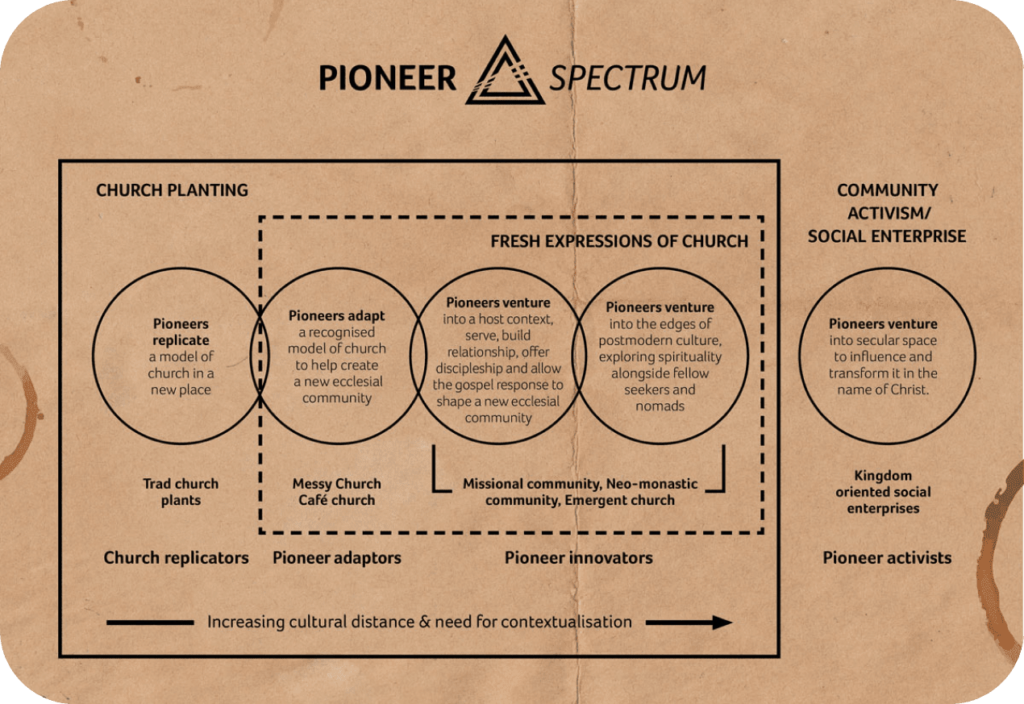The landscape of the Church in the United Kingdom has been rapidly changing, with less than 50% of the population identifying as Christians. In response to this shift, ministry leaders are “pioneering” new ways of building community and discipleship outside of the traditional church walls. The Church of England has recognized the importance of moving towards a mixed ecology of the church, where faithful innovation in ministry is the key to revitalizing a post-Christian landscape.
“We’ve changed the air. And to me, this is the critical thing in any theological education or any education institution: What air are your students breathing, and is it air that helps them celebrate the gifts of who they are and what they bring and what they feel God has called them to do? Is it an air of possibility and imagination?”
What is a ‘Pioneering’ Ministry?
The Pivot Podcast recently welcomed guest Jonny Baker, who engaged hosts Terri Elton and Dwight Zscheile in a conversation centered on the hows and whys of what he calls “pioneering.”
Let’s define it: We use several terms that are deeply interconnected when we talk about faithful innovation in ministry. Whether we’re calling it Fresh Expressions, ministry entrepreneurship, or pioneering, the focus is on creative ministry that happens outside of the walls of the church, typically involving service, community-building, and discipleship. This is one part of what we call the mixed ecology of the church – the necessary relationship between the traditional church and these less conventional ministries.
Jonny is a longtime leader in innovative ministry in the UK context, and currently serves as Director of Pioneer Training at the Church Mission Society, which is based in Oxford. He is the author of several books, including Pioneer Practice.

According to 2021-22 Census Sources.
The Challenges and Opportunities of Pioneering Ministry in a Post-Christian Landscape
The UK is officially a minority Christian country, with less than 50% of the population claiming the identity – some might even call it a post-Christian nation. According to Jonny, this shifting landscape presents both unique possibilities and difficult challenges.
On the one hand, there’s a huge population of people who have no personal baggage or history with the church. It’s not on their radar as something they’ve experienced at all, which can present unique opportunities for ministry.
On the other hand, there is an almost cross-cultural level of challenge when it comes to this population. Jonny referenced the fact that when polled, 85% of those in the UK who identified as something other than Christian said they would never, or were very unlikely to ever, attend church.
What does that mean for ministry leaders?
Rather than pouring all their energy into creating a rich and inviting traditional church that no one plans to ever visit or attend, ministry leaders in the UK are being encouraged to pioneer: to go off into the fringes, to build community in unexpected places, and to serve and make disciples of whoever’s there.
The Church of England itself has recommended that more and more ministry leaders take this tack, so that the Christian community can be built up from the outside. Jonny shares that it’s an exciting and challenging space where creativity, risk-taking, and faith meet;
“I’m pretty excited about that, to be honest. It’s a challenge. It’s an adventure.”

The Pioneering Spectrum: Exploring the Different Approaches to Innovative Ministry
The word “pioneer” may have a bit of a complex history here in the US, but it’s not such a loaded term in the UK. Pioneers, quite simply, are the people who start something new.
Jonny Baker described the pioneering ministry spectrum as ranging along an axis of increasing “cultural difference” from the team of pioneers involved.. Sometimes, pioneering may look like church planting, when the team focuses on simply replicating a preexisting system.
However, more often, pioneering ministries fall into the “adapt” and “venture” categories – social enterprises, community projects, activism. Rather than simply replicating pre-existing systems, pioneers are encouraged to adapt and venture into unexpected areas of community building and discipleship.
Jonny referenced the model of small groups of people living in a deprived housing area, joining in food banks, and participating for the good of the community in order to make disciples. He also pointed to the practical usefulness of incorporating a business aspect into whatever the venture might be, given the reality that, most times, resources are necessary.
Some of the communities Jonny has seen thrive include:
· A church that sprang up in a community of boxers, even including a Compline service that involved the ringing of the boxing ring bell.
· Clean for Good, an ethical cleaning company started in Parish of St Andrew-by-the-Wardrobe.
· A coffee roastery run by ex-offenders.
· A group called Revs, where members gather around restoring car engines.
· A football club, a food pantry, AND a group for lonely elderly and disabled folks to share a meal together – all started by a community member named Wayne who simply followed the tug at his heartstrings.

Photo Credit: Katie Garner
Lessons from Pioneer Leaders in Ministry Innovation: for clergy and lay leaders alike
So, how can ministry leaders start something new and cultivate new expressions of church? Here are some primary lessons and bits of wisdom from pioneers in ministry innovation:
1. Start with that tugging of the heartstrings. All you really need is a heart for people, a glimmer of an idea, and a “give it a go, see what happens” attitude to follow the glimmer where it leads. Jonny suggests meeting with others somewhere cozy and exploring whatever tugs at your heartstrings. Some helpful questions to dive into include: What’s bugging you? What are you longing for? and What’s possible?
2. Build trust and relationship. This is key when starting anything new. For lay people, it’s essential to find others who share your vision and to test out your ideas with others. For leaders in established churches, it’s crucial to encourage and support those who are exploring possibilities beyond the walls of the current church, and to keep that relationship going, even if the new venture becomes independent.
3. Navigate roadblocks and challenges. This is just part and parcel of the journey to the new. Jonny emphasizes the importance of spiritual practices, having a spiritual director, and setting up a support network to build resilience when facing difficult times. He also suggests being aware of the challenges of navigating change in a system like the church and being careful not to make life more difficult than it needs to be.
4. Change the air. Changing the air is critical in any educational institute, and this is particularly true for theological education. Jonny emphasizes the importance of creating an atmosphere of possibility and imagination for pioneers, where they feel celebrated and empowered to bring their ideas to fruition.
Pioneering ministry may look different for everyone, but the key is to follow that tugging of the heartstrings and have the courage to take risks and try something new. With trust, resilience, and an atmosphere
As we move more and more towards a mixed ecology as a global church, the revitalizing power of the intersection between tradition and innovation becomes more and more apparent.
“I like the language of faithful innovation. I think putting the word faithful with new helps people feel that the new isn’t going to rubbish the old… At the least, [the old is] going to be resourced. The tradition holds a lot of treasure.”
Through a pioneering ministry, we can reinvigorate the church in a changed landscape by exploring new avenues for ministry while also honoring tradition.



